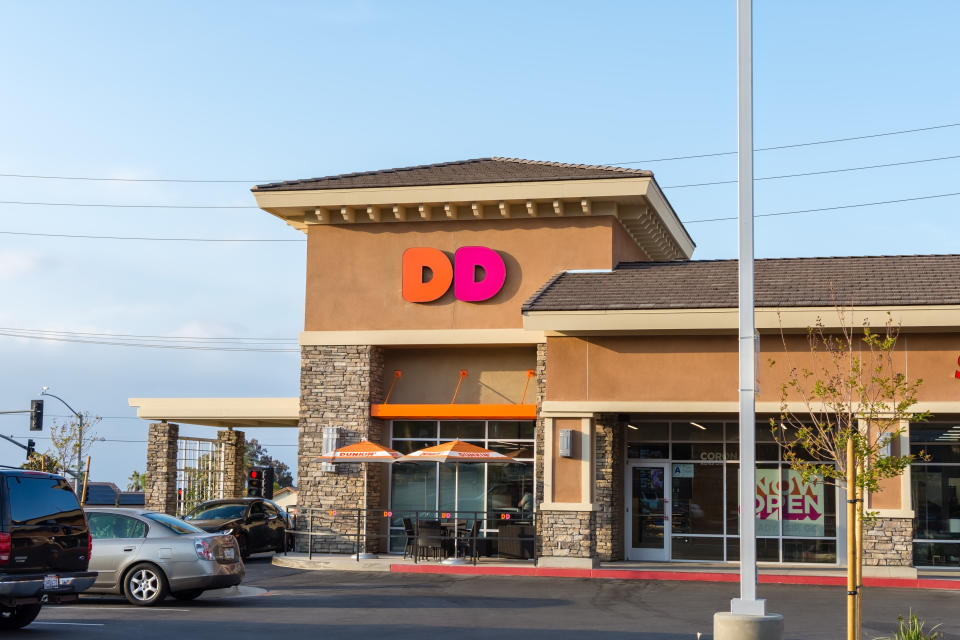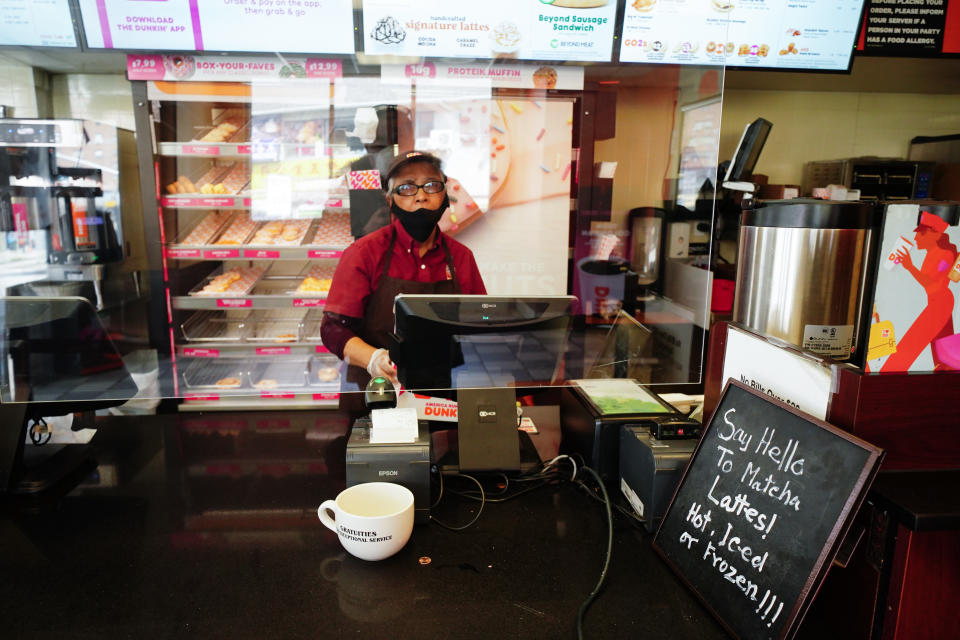Dunkin' CEO: We are focused on taking care of our brands and being a good corporate citizen
More drive-thrus, more restaurants west of the Mississippi and more safety measures inside stores is what life has in store for Dunkin’ Brands (DNKN), post the worst of the COVID-19 pandemic.
But before reaching that promise land, Dunkin’ must navigate some challenging conditions that have plagued the broader restaurant industry for months already. That includes scores of closed restaurants across the country, nervous franchisees and a U.S. consumer that is experiencing a major financial shock.
Some of those things were on display in Dunkin’s first quarter results.
Dunkin’s first quarter sales came in at $323.1 million, beating estimates for $302 million. Earnings of 67 cents a share were in line with analyst projections. Same-store sales at Dunkin’ U.S. rose 3.5% in the first 10 weeks of the quarter, but fell 19.4% the last three weeks as quarantines and store closures took hold. Baskin Robbins U.S. saw sales surge 11% in the first 10 weeks of the quarter, but then tailed off by 23.3% in the final three weeks.
The company pulled its full-year and longer-term guidance. Dunkin’ also temporarily suspended its dividend to conserve cash.
Yahoo Finance spoke with Dunkin’ Brands CEO David Hoffmann about the quarter and road ahead. What follows is an edited and condensed version of the chat.
Brian Sozzi: Take us through the business a little bit. We're seeing a lot of different trends throughout the restaurant industry. We've had a lot of restaurant closures, but some stores are open and delivering. What does it look like from the Dunkin’ perspective?
David Hoffmann: Prior to the crisis we were headed towards our best quarter since 2013 with positive traffic and then once the crisis hit we just went inward and we started to really focus on simply just doing the right thing for our franchisees, our suppliers, our brand new employees and our guests.
We have looked at everything. We then geared towards the safety and security of our crew and our guests. We've made a brand standard, gloves, masks, plexiglas guards, as well as we just shipped infrared thermometers to every restaurant in the U.S. this past week to be prepared. On the franchisee side, we've really rallied around each other but we made the restaurant easier to operate and very flexible hours of operation. Very flexible on the menu as well. We have also had a big focus around the financial health of the franchisees and their liquidity. So we extended payment terms on a lot of items related to franchise fees and the marketing fees just to make sure that all three legs of the stool the franchisees, the brand and our suppliers were strong during all of this.
Sozzi: When will your restaurants in some of your bigger markets like New York City reopen?
Hoffmann: We're starting to see more openings every day. So today, 90% of our restaurants are open on the Dunkin’ side and the Baskin side. A lot of universities, a lot of transportation hubs, and then in New York as well, are temporarily closed today. But we're seeing more and more openings in the New York area, where it has been the hardest hit.
But again, we view those as temporary closings, and we're really encouraged by what we're seeing. And on the earnings call, I noted we saw same-store sales down 35% in the month of March. Now it's hovering around minus 20%. Still not an acceptable level, but you're starting to see those stimulus checks, roll in a few of the markets starting to open up and be little bit looser with getting out and active again. So we're encouraged by some of the green shoots that we're seeing out there.
And look, we'll do whatever it takes to get New York up and running again. And so we just stand with our franchisees down there and applaud everything that they've done in the local hospitals as well.

Sozzi: The U.S. economy is in a severe downturn. Are you seeing consumers trade down at Dunkin’?
Hoffmann: Actually, our average ticket is growing. You can understand that because people are coming through and ordering for bigger group sizes. But it's been pretty broad-based — I mean food and beverages both up, matcha lattes are up in terms of the new new items. What we have seen though, and and again, this is intuitive, with people at home the 6am to 9am day-part has shifted to 10am to 2pm where we're seeing positive sales year-over-year.
We think when the workforce comes back we're going to continue to capture business. But we like what we're seeing out of the afternoon. We've spent some considerable resources in that afternoon day-part as well. With whether it's our happy hour or espresso or in our snacking menu. Right now we've got croissant stuffers. In the restaurants we're not doing a lot of advertising. It's a lot of in store, but it's doing incredibly well and those are the types of great on-the-go food that we think our customers are asking for and pairing well with our beverage offerings.
Sozzi: How will the COVID-19 situation change Dunkin’?
Hoffmann: Two forces that we are really geared on. One is obviously safety. The other one, though, is around brand access. And what we were already invested in heavily pre-crisis, about 90% of our transactions went out the door through some form of takeaway, so it is easier for us to flex into that whatever the new customer reality is going to look like. We think we're well poised for that.
About 70% of our portfolio is comprised of drive-thrus, we've added 1,000 curbside locations during the crisis. We have celebrated digital in a big way. We've got five 400,000 new active [digital] users from the fourth quarter of last year to the first quarter of this year. Our delivery footprint has doubled from 2,000 stores to 4,000 stores. On-the-go mobile ordering has done very well.
And throw in our consumer products business which is up 20% to 30% with our bag coffee and K cups.
So we think that allowing the consumer to access your brand, wherever they want to do it in whatever new environment there's going to be is important. We think we're well suited for that.
Sozzi: There will be a lot of restaurants that do not reopen after the crisis. What will that mean for the growth trajectory of Dunkin’ Brands?
Hoffmann: When you step back as a patriot, it's really sad to see all of this. So you don't wish that upon anyone. And so, that is, unfortunately what's going on right now.
But look, right now we're just focused on taking care of Dunkin’ and Baskin Robbins and being a good corporate citizen in the communities we serve today. I think down the road, there's a time to come and evaluate opportunities. That’s not our mission now.
But I will tell you my experience overseas — and as I like to say here internally, I feel like I've been in every crisis management foxhole possible — one of the things that we did do was separate and create a green team that was completely separate from the daily crisis management team. That green team is focused on our business model, what we think we do well and can accentuate and what are some of our opportunities but also how we're going to re-emerge from this. So we've already started thinking about expanding our footprint west of the Mississippi as a lot of the whitespace may be available
So the discussions are going on behind the scenes, but I think that's going to have to wait for another day. Right now, we're just focused on making sure that all three legs of our stool, which are our franchisees, our suppliers, and our brand are standing tall right now.

Sozzi: Have some of your franchisees successfully accessed the PPP [Paycheck Protection Program] loans?
Hoffmann: As a publicly traded company, let me say that Dunkin’ Brands has neither applied for that and will not take that government money. So we are heavily focused on keeping America working. We have no plans to furlough any employees. So we feel like that's been our obligation. But, conversely our franchisees are great franchisees who employ on average 150 employees, and we think PPP speaks directly to them. And we have helped them. Many have taken advantage of this. We've done a lot of communication work with financial institutions, and we have done webinars as well. We're very, very grateful and appreciative of the federal government and the governors who have assisted in this program, because it's really helped our franchisees keep America working during these times. So, very appreciative of what's going on with the government support there.
Sozzi: Do you think the restaurant industry needs a more targeted relief plan?
Hoffmann: I do. I'm part of the National Restaurant Association and the White House team looking at opening up the the economy a bit more. And so look, there's a program that's been advanced around that I support. I think it's a well targeted, well placed program, and I stand with the National Restaurant Association on how they're trying to advance that not just for franchise restaurants like ourselves who are small independent business owners, but for all the independent business owners that drive this economy and the service workers as well. So I would love to see that push through.
Brian Sozzi is an editor-at-large and co-anchor of The First Trade at Yahoo Finance. Follow Sozzi on Twitter @BrianSozzi and on LinkedIn.
Read the latest financial and business news from Yahoo Finance
Levi's reports solid quarterly earnings, CEO says jeans maker will come out of coronavirus stronger
Yum! Brands CEO on how his 50,000 restaurants are doing amidst the coronavirus pandemic
Grubhub founder: our sign-ups are surging during the coronavirus
HP CEO: here’s how we are helping coronavirus relief efforts
Follow Yahoo Finance on Twitter, Facebook, Instagram, Flipboard, SmartNews, LinkedIn, YouTube, and reddit.

 Yahoo Finance
Yahoo Finance 